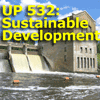This course emphasizes the local and regional scale of sustainability; the role of planning, land policy, local economic development, and regional planning; and the relationship between human settlement patterns and environmental consequences. We examine the conflicts between local economic development, environmental protection and social justice -- and planning strategies to resolve these conflicts. We will engage "sustainability" both as a useful organizing principle for planning and as a problematic concept to be challenged and updated.
Why another course on sustainability? Graduate students come with rich and varied knowledge and experiences with sustainability, and programs across campus now widely engage the issue. The purpose of a stand-alone graduate planning course on sustainability is to develop a specifically urban & regional framework for sustainability; to examine specific local case studies; and to critically evaluate the connections and conflicts in sustainability concepts and practices.
Five central course themes:
Urban Form/Land Use: the impact of urban form and density on sustainability (including the compact city debate); river basin planning; (green and gray) infrastructure such as transit and water; greenbelts; ecoregions.
Community Economic Development: the shift from growth-oriented economic development to steady state economics? regenerative sustainability; green economy; the benefits of localism; the challenges of eco-gentrification; resource-dependency (water, timber, mining).
Ideas: the emergence of sustainability in planning thought; the current state of sustainability thinking in the profession; environmental preservation versus social justice; resilience; political ecology; alternative environmental economics; wicked problems and complex adaptive systems.
Institutions: local sustainability plans; local sustainability offices and jobs; efforts by cities to measure local sustainability; market vs. regulatory approaches to sustainability; strategies to lower automobile dependence (including complete streets and pedestrian/bicycle plans).
Climate Change and the Future: If sustainability was once the fear that we were extracting resources from nature's "warehouse" at too fast a rate, we are now worried that the warehouse itself is on fire; theories of sustainability transition. Urban ecological utopias and dystopias.
Prerequisites
Graduate standing or permission of instructor. The course has no formal prerequisites. Students from other programs (e.g., SEAS, Ford School, Public Health, Architecture, Social Work, Civil Engineering, Business, Law, LS&A, etc.) are encouraged to participate. Questions? Feel free to email me.
General Information for all Urban and Regional Planning Courses (required syllabus information):
Academic Integrity and Plagiarism Policy
The Rackham Graduate School policy states: “Integrity in research and scholarship is a fundamental value of the University of Michigan. It is the responsibility of all students to conduct research and scholarly activities in an ethical manner at all times.” This requires that you are honest in all your course work.
Plagiarism is the use of someone else’s words, ideas, or work as one’s own in writing or presentations, and failing to give full and proper credit to the original source. It is failing to properly acknowledge and cite language from another source, including paraphrased text. Plagiarism is a serious offense that will lead to grade penalties and a record filed with Taubman College. It may lead to failing a course or expulsion from the university.
Taubman College Academic and Professional Student Conduct Policies
These policies apply to all Taubman College students as well as non-Taubman College students who take courses within the college.
Statement on Diversity, Equity, and Inclusion
Taubman College affirms the principles of diversity, equity, and inclusion as we organize resources and priorities that align with our values. We seek to have a diverse group of persons at all levels of the college - students, faculty, staff and administrators - including persons of different race and ethnicity, national origin, gender and gender expression, socioeconomic status, sexual orientation, religious commitment, age, and disability status. We strive to create a community of mutual respect and trust, a community in which all members and their respective backgrounds, identities, and views are represented without any threat of bias, harassment, intimidation, or discrimination.
Statement on Student Mental Health and Wellbeing
Taubman College is committed to advancing the mental health and wellbeing of its students. Studies and surveys indicate clearly that a variety of issues, such as strained relationships, increased anxiety, alcohol/drug problems, and depression, directly impact student academic performance. If you or someone you know is feeling overwhelmed, depressed, and/or in need of support, please reach out to any of the following for assistance:
Counseling and Psychological Services (CAPS) is dedicated to serving students. You can find their contact information and hours at the link to their website.
Accommodations for Students with Disabilities
If you think you need an accommodation for a disability, please inform the instructor. Some aspects of this course – including assignments, and in-class activities – may be modified to facilitate your participation and progress. We will work with Services for Students with Disabilities to determine appropriate academic accommodations. We will treat any information you provide as private and confidential.
|

